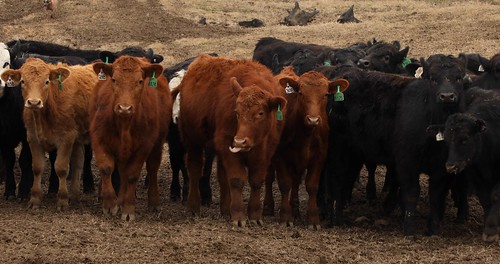Cattle genetics expert hosts AI programs April 25-26, June 27-28
April 15, 2019
By Mary Hightower
U of A System Division of Agriculture
Fast facts
(557 words)
Download Word version.
HOPE, Ark. – Cattle producers wanting to improve their stock through artificial insemination
will have the opportunity to take part in a comprehensive, hands-on training program
to be held April 25-26 and June 27-28.
IMPROVED GENETICS - The Division of Agriculture is hosting workshops to help cattle
producers improve their herd genetics. (U of A System Division of Agriculture photo
by Nick Kordsmeier)
Charles Looney, professor and extension cattle improvement specialist for the University
of Arkansas System Division of Agriculture, is hosting the two training courses at
the division’s Southwest Research and Extension Center near Hope, 362 Highway 174
north. The center is part of the Arkansas Agricultural Experiment Station.
“For each one of these courses we include speakers from industry in herd health and
nutrition,” Looney said. “We cover good management practices and record keeping. It’s
two full days of practicing artificial insemination technique with live cows and tracts. We
even use an artificial cow to give the participants as much practice as possible.”
The two-day programs run from 8 a.m.- 7p.m. on the first day and 8 a.m.- 4 p.m. on
the second day, and include:
- Basic reproductive anatomy and physiology
- Estrous synchronization
- Semen handling
- Pregnancy determination methods
- Reproductive health
- Training in artificial insemination on live cattle.
The cost to attend is $400 and participants may register online for the April 25-26
program at https://uada.formstack.com/forms/swrec_ai_april. Lunch will be provided both days.
Details for registration for the June program are forthcoming.
Looney said these training courses are a foundation for a program to help Arkansas,
and eventually all U.S. ranchers, improve the overall quality of their herds.
“My goal is to construct an educational center whereby cattle and people can be safely
managed in an advanced training program,” he said. “I want it to become nationwide
program.”
The program is being offered in partnership with SelectSires Southeast Division.
Future learning opportunities
“Our program will focus on these training programs. We will include pregnancy determination
using ultrasound at least twice per year. We also will include embryo transfer,” Looney
said.
“We are using these technologies here at Hope in our demonstration herd to develop
the best commercial beef cattle in Arkansas,” he said. Eventually, Looney plans to
hold a sale at the station, “whereby ranchers can come and share our genetics.”
For more information about cattle improvement, contact your county extension office
or visit www.uaex.uada.edu.
About the Division of Agriculture
The University of Arkansas System Division of Agriculture’s mission is to strengthen
agriculture, communities, and families by connecting trusted research to the adoption
of best practices. Through the Agricultural Experiment Station and the Cooperative
Extension Service, the Division of Agriculture conducts research and extension work
within the nation’s historic land grant education system.
The Division of Agriculture is one of 20 entities within the University of Arkansas
System. It has offices in all 75 counties in Arkansas and faculty on five system campuses.
The University of Arkansas System Division of Agriculture is an equal opportunity
institution. If you require a reasonable accommodation to participate or need materials
in another format, please contact the SW Research and Extension Center at 870-777-9702,
or clooney@uada.eduas soon as possible. Dial 711 for Arkansas Relay.
# # #
Media Contact: Mary Hightower
Dir. of Communication Services
U of A Division of Agriculture
Cooperative Extension Service
(501) 671-2126
mhightower@uada.edu
